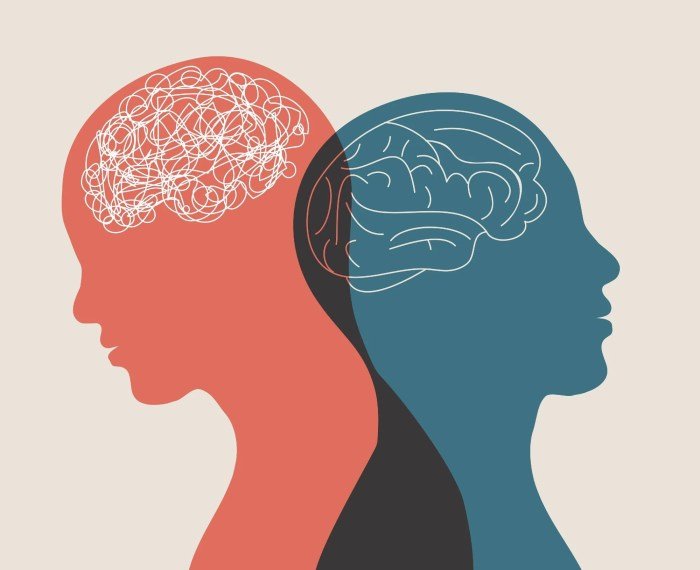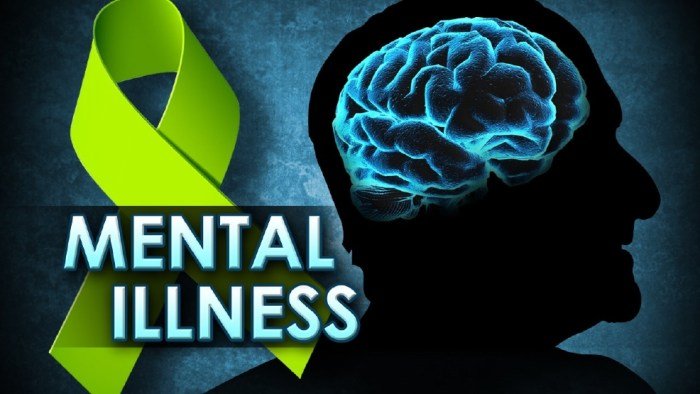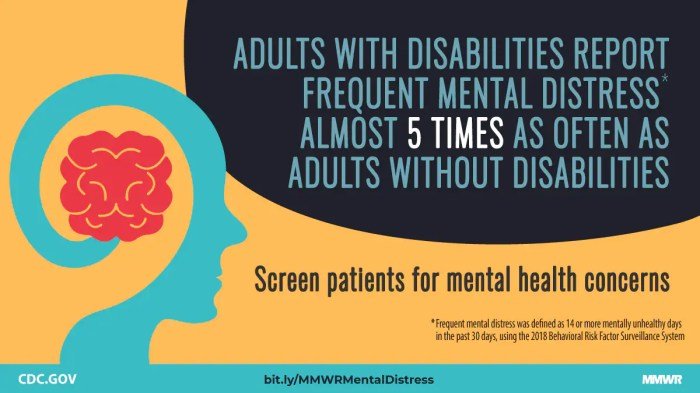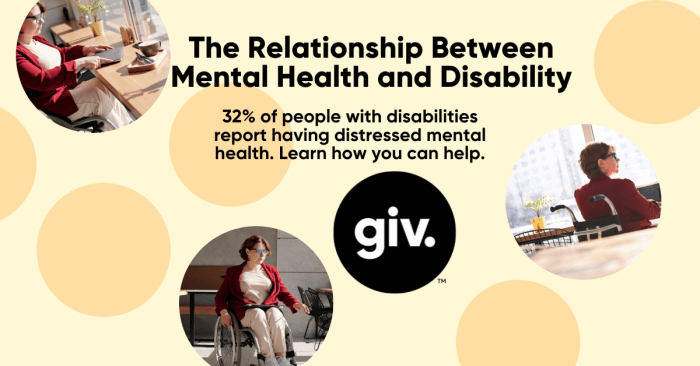Mental health as a disability is a complex and multifaceted issue, requiring a nuanced understanding of how mental illness intersects with disability. This topic explores the historical context, legal frameworks, and societal perceptions surrounding mental health disabilities. It also delves into the personal experiences of individuals living with these conditions, highlighting the challenges they face in education, employment, and social participation.
By examining the impact of mental health disabilities on individuals and communities, this discussion aims to foster empathy, promote understanding, and advocate for greater accessibility and inclusion for those who experience mental health challenges. This exploration sheds light on the crucial role of support services, advocacy initiatives, and ongoing research in creating a more equitable and supportive environment for individuals with mental health disabilities.
Understanding Mental Health as a Disability

Mental health and disability are interconnected, and recognizing this connection is crucial for understanding the experiences of individuals with mental health conditions.
Defining Mental Health and Disability, Mental health as a disability
Mental health encompasses our emotional, psychological, and social well-being. It influences how we think, feel, and behave. A disability, on the other hand, is a physical or mental impairment that substantially limits one or more major life activities. Mental health conditions can significantly impact an individual’s ability to participate in daily life, making them qualify as a disability.
History of Recognizing Mental Illness as a Disability
The recognition of mental illness as a disability has been a long and evolving process. Historically, mental health conditions were often stigmatized and misunderstood. However, the disability rights movement and advocacy efforts have led to increased awareness and recognition of mental health as a legitimate disability.
Examples of Mental Health Conditions Often Considered Disabilities
Several mental health conditions are frequently considered disabilities, including:
- Depression: A mood disorder characterized by persistent sadness, loss of interest, and changes in sleep, appetite, and energy levels.
- Anxiety Disorders: A group of conditions characterized by excessive worry, fear, and nervousness, often accompanied by physical symptoms like rapid heartbeat and sweating.
- Schizophrenia: A severe mental disorder that affects a person’s ability to think, feel, and behave clearly.
- Bipolar Disorder: A mood disorder characterized by alternating periods of mania (high energy and mood) and depression.
- Obsessive-Compulsive Disorder (OCD): A disorder characterized by intrusive thoughts and repetitive behaviors.
- Post-Traumatic Stress Disorder (PTSD): A mental health condition that develops after a traumatic event, characterized by flashbacks, nightmares, and avoidance behaviors.
- Attention-Deficit/Hyperactivity Disorder (ADHD): A neurodevelopmental disorder characterized by inattention, hyperactivity, and impulsivity.
It’s important to note that not everyone with a mental health condition will qualify for disability benefits. Eligibility criteria vary depending on the specific condition, its severity, and the individual’s functional limitations.
Legal and Societal Recognition: Mental Health As A Disability

Recognizing mental health as a disability is crucial for ensuring individuals with mental health conditions receive the support and protection they deserve. This recognition is reflected in legal frameworks and societal attitudes, which can either facilitate or hinder access to resources and opportunities.
Recognizing mental health as a disability is crucial for fostering inclusive communities. Access to physical activity can be a valuable tool for managing mental health challenges, and fitness centers in Indianapolis offer a variety of programs that cater to different needs.
By promoting physical well-being alongside mental health awareness, we can create a more supportive environment for individuals facing these challenges.
Legal Frameworks Protecting Individuals with Mental Health Disabilities
Legal frameworks play a vital role in safeguarding the rights of individuals with mental health disabilities. They establish clear guidelines and regulations to prevent discrimination and promote equal opportunities.
- The Americans with Disabilities Act (ADA) in the United States prohibits discrimination against individuals with disabilities, including those with mental health conditions, in employment, public accommodations, transportation, and other areas.
- The United Nations Convention on the Rights of Persons with Disabilities (UNCRPD) is an international treaty that promotes the rights and dignity of individuals with disabilities, including those with mental health conditions. It emphasizes the importance of inclusion, accessibility, and non-discrimination.
- Other legal frameworks, such as the Mental Health Parity and Addiction Equity Act in the United States, address specific aspects of mental health care, ensuring that insurance coverage for mental health services is equivalent to coverage for physical health services.
Impact of Societal Attitudes and Stigma
Societal attitudes and stigma surrounding mental health can significantly impact the lives of individuals with mental health disabilities. Negative perceptions and misconceptions can lead to discrimination, isolation, and a reluctance to seek help.
- Stigma can prevent individuals from disclosing their mental health conditions, fearing judgment, discrimination, or loss of employment or social opportunities.
- Negative stereotypes and misconceptions about mental illness can perpetuate fear and misunderstanding, making it difficult for individuals to access support and treatment.
- The stigma associated with mental health can also contribute to delayed diagnosis and treatment, as individuals may avoid seeking help due to shame or fear.
Challenges Faced by Individuals with Mental Health Disabilities
Individuals with mental health disabilities often face unique challenges compared to other disability groups. These challenges can arise from the nature of mental health conditions, societal attitudes, and limited access to resources.
- Mental health conditions are often invisible, making it difficult for others to understand and empathize with the experiences of individuals with these conditions.
- Stigma and discrimination can lead to social isolation and exclusion, making it challenging for individuals to build meaningful relationships and participate fully in society.
- Access to mental health services can be limited, particularly in rural areas or for individuals with limited financial resources.
Impact on Individuals and Communities

Living with a mental health disability can significantly impact individuals’ lives and the communities they are part of. It can affect their personal experiences, education, employment, and social participation. Understanding the impact of mental health disabilities is crucial for promoting inclusivity and supporting individuals in navigating these challenges.
Personal Experiences
The personal experiences of individuals living with mental health disabilities can be diverse and complex. Some individuals may experience periods of intense distress, while others may face ongoing challenges in managing their symptoms. These experiences can be influenced by factors such as the type of mental health condition, its severity, and the individual’s coping mechanisms.
Recognizing mental health as a disability is crucial for accessing the right support. If you’re seeking information about mental health services covered by Meritain, you can reach their providers directly by calling meritain health providers phone number. This can be a valuable step in navigating the complexities of mental health care and finding the resources you need.
“Living with a mental health disability can be a daily struggle. It can affect your ability to concentrate, make decisions, and interact with others. It can also lead to feelings of isolation and shame.”
Anonymous
It’s essential to recognize that each individual’s experience is unique, and there is no one-size-fits-all approach to understanding the impact of mental health disabilities.
Support and Advocacy

Providing adequate support and advocating for the rights of individuals with mental health disabilities is crucial for their well-being and integration into society. This section explores the role of mental health professionals, various support services, and successful advocacy initiatives that promote the rights and well-being of individuals with mental health disabilities.
Role of Mental Health Professionals
Mental health professionals play a vital role in supporting individuals with disabilities by providing specialized care and guidance. Their responsibilities include:
- Diagnosis and Treatment:Accurately diagnosing mental health conditions and developing personalized treatment plans tailored to individual needs.
- Medication Management:Prescribing and monitoring medication to manage symptoms and improve overall well-being.
- Therapy and Counseling:Providing individual, group, or family therapy to address emotional, behavioral, and cognitive challenges.
- Crisis Intervention:Offering immediate support and resources during mental health emergencies.
- Education and Advocacy:Educating individuals, families, and communities about mental health conditions and advocating for their rights.
Types of Support Services
Individuals with mental health disabilities can access a range of support services designed to enhance their quality of life and promote their independence. These services include:
- Psychotherapy:Individual, group, or family therapy to address mental health concerns and develop coping mechanisms.
- Medication Management:Regular monitoring and adjustments of medication to ensure optimal effectiveness and minimize side effects.
- Case Management:Coordinating and linking individuals with necessary services, such as housing, employment, and social support.
- Supported Employment:Providing job training, placement, and ongoing support to individuals with disabilities seeking employment.
- Peer Support:Connecting individuals with others who have similar experiences, offering empathy, understanding, and practical advice.
- Residential Services:Providing safe and supportive living environments for individuals who require assistance with daily living activities.
- Crisis Services:Offering immediate intervention and support during mental health emergencies, such as suicide prevention hotlines and mobile crisis teams.
Successful Advocacy Initiatives
Several advocacy initiatives have successfully promoted the rights and well-being of individuals with mental health disabilities. These initiatives have focused on:
- Legislative Advocacy:Lobbying for policies that protect the rights of individuals with mental health disabilities, such as access to healthcare, employment, and education.
- Public Awareness Campaigns:Raising awareness about mental health conditions and challenging stigma and discrimination.
- Community Engagement:Building partnerships with community organizations, businesses, and individuals to create inclusive and supportive environments.
- Legal Advocacy:Representing individuals with mental health disabilities in legal proceedings to ensure their rights are upheld.
Challenges and Future Directions

While significant progress has been made in understanding and addressing mental health as a disability, there are still substantial challenges to achieving full inclusion and equality for individuals with mental health disabilities. These challenges are rooted in societal stigma, systemic barriers, and a lack of comprehensive support systems.
Mental health conditions are often invisible, but they can have a significant impact on a person’s life. Recognizing them as disabilities is crucial for fostering understanding and support. Products like the jonathan green black beauty ultra might not directly address mental health issues, but they can contribute to a sense of well-being and self-care, which is essential for managing mental health challenges.
This section explores these challenges and Artikels future directions for creating a more inclusive and supportive environment for individuals living with mental health disabilities.
Challenges to Full Inclusion and Equality
The path towards full inclusion and equality for individuals with mental health disabilities is fraught with challenges, stemming from a complex interplay of societal attitudes, systemic barriers, and inadequate support systems. These challenges manifest in various ways, impacting individuals’ access to education, employment, healthcare, and social participation.
- Stigma and Discrimination:The stigma surrounding mental illness remains a significant barrier to inclusion and equality. This stigma often leads to discrimination in various aspects of life, including employment, education, and social interactions. Individuals with mental health disabilities may face prejudice, stereotypes, and negative assumptions, hindering their ability to fully participate in society.
- Limited Access to Quality Mental Healthcare:Inadequate access to quality mental healthcare services is a pervasive challenge. This includes limited availability of mental health professionals, long wait times for appointments, and insufficient insurance coverage for mental health services. These limitations create significant barriers to timely and effective treatment, perpetuating the cycle of disability and hindering recovery.
- Lack of Supportive Environments:The lack of supportive environments in workplaces, educational institutions, and communities exacerbates the challenges faced by individuals with mental health disabilities. This includes a lack of awareness and understanding of mental health issues, inadequate accommodations, and a shortage of resources and support services.
These factors contribute to feelings of isolation, exclusion, and difficulty in managing mental health conditions.
- Systemic Barriers in Employment:Individuals with mental health disabilities often face significant barriers to employment. These barriers include discriminatory hiring practices, a lack of accommodations in the workplace, and limited access to vocational training and job placement services. The stigma associated with mental illness can also make it difficult for individuals to disclose their conditions, leading to further disadvantages in the job market.
Areas for Further Research and Advocacy
Addressing the challenges faced by individuals with mental health disabilities requires a multifaceted approach that involves research, advocacy, and policy changes. Several areas require further research and advocacy to ensure that individuals with mental health disabilities are fully included and supported.
- Developing Effective Interventions and Treatments:Research into the causes, prevention, and treatment of mental illness is crucial for improving outcomes and reducing the impact of mental health disabilities. This includes exploring new therapies, medications, and interventions, as well as investigating the effectiveness of existing approaches.
- Addressing Stigma and Discrimination:Raising awareness and challenging stigma surrounding mental illness is critical. This can be achieved through public education campaigns, media representation, and promoting positive narratives about mental health. Advocating for policies that prohibit discrimination based on mental health status is also essential.
- Improving Access to Mental Healthcare:Ensuring adequate access to quality mental healthcare services is a top priority. This includes increasing the number of mental health professionals, expanding insurance coverage for mental health services, and promoting telehealth options to reach individuals in underserved areas.
- Creating Supportive Environments:Creating inclusive and supportive environments in workplaces, schools, and communities is essential. This involves promoting mental health awareness and understanding, providing accommodations for individuals with mental health disabilities, and developing resources and support services.
- Promoting Employment Opportunities:Addressing the employment barriers faced by individuals with mental health disabilities requires a multifaceted approach. This includes advocating for anti-discrimination laws, promoting workplace accommodations, and expanding access to vocational training and job placement services.
Key Challenges and Potential Solutions
The table below summarizes key challenges faced by individuals with mental health disabilities and potential solutions to address them:
| Challenge | Potential Solutions |
|---|---|
| Stigma and discrimination | Public education campaigns, media representation, anti-discrimination laws, promoting positive narratives about mental health. |
| Limited access to quality mental healthcare | Increasing the number of mental health professionals, expanding insurance coverage, promoting telehealth options. |
| Lack of supportive environments | Promoting mental health awareness and understanding, providing accommodations, developing resources and support services. |
| Systemic barriers in employment | Anti-discrimination laws, workplace accommodations, vocational training, job placement services. |
Ending Remarks

Understanding mental health as a disability is essential for creating a society that truly values inclusivity and supports the well-being of all its members. By acknowledging the unique challenges faced by individuals with mental health disabilities and advocating for their rights, we can work towards a future where everyone has the opportunity to thrive.
This includes ensuring access to quality mental health services, promoting awareness and reducing stigma, and creating inclusive environments that empower individuals to reach their full potential. Ultimately, recognizing mental health as a disability is not just about providing support but about fostering a sense of belonging and dignity for everyone.
Answers to Common Questions
What are some common examples of mental health conditions considered disabilities?
Mental health conditions often considered disabilities include depression, anxiety disorders, bipolar disorder, schizophrenia, obsessive-compulsive disorder (OCD), post-traumatic stress disorder (PTSD), and attention-deficit/hyperactivity disorder (ADHD), among others. The specific conditions recognized as disabilities may vary depending on legal frameworks and regional regulations.
What are some common misconceptions about mental health as a disability?
Some common misconceptions include the belief that mental health disabilities are solely a personal weakness, that individuals with these conditions are dangerous or unpredictable, or that they can simply “snap out of it.” These misconceptions contribute to stigma and hinder access to support and resources.
How can I be an ally to individuals with mental health disabilities?
You can be an ally by being respectful, understanding, and compassionate. Educate yourself about mental health disabilities, challenge stigma, and advocate for greater inclusion and accessibility. Support organizations that promote mental health awareness and provide services to those in need.